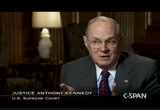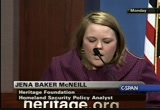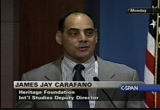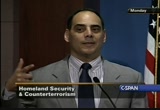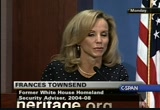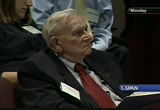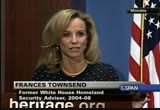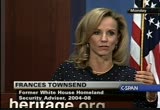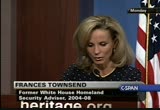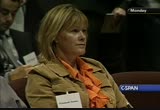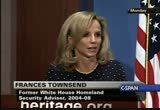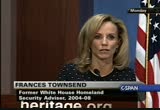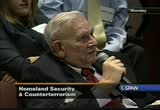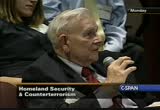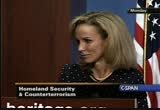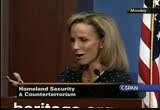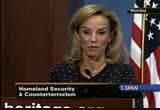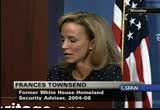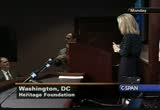tv Prime News HLN September 29, 2009 4:10am-5:00am EDT
4:14 am
there are cases that we've seen pop up, dozens since 9/11, i think we worry about this one in a special way. because of what it suggests to us about the absolute continuing commitment of our enemies to attack us here at home. this one is different. at least it appears different from everything we're reading in the press, what we see in the court documents. and so this is a good time for us to reflect on the mission. i was at the government, and i was at the u.s. chamber of commerce and i got a request to speak by then congressman ray lahood. ray was having a constituent forum. and he had these business groups up. he wanted to come up and speak about homeland security. i arrived a little bit early. and i was shown to a seat.
4:15 am
4:16 am
speech aside. and i thought, okay, this is a real -- this is a public speakers real nightmare. i said, you know, we have something? common. i too believe in things that were possible. and if i had asked that same audience the likelihood that we would get more than eight years now without another attack on american soil, those people would have raised their hands and told me that was impossible. and with the work of many men and women around the world in p uniform in the cia in homeland security, in the fbi, and the justice department, we manage to believe in the impossible but we e did the impossible. i start with that story because i think we need to appreciate the difficulty of the task and the responsibility we put on the
4:17 am
nation's public service. not only here in washington and deliver departments but in state and local agencies, this really, we really do ask them to do something that is near impossible. when you understand that you're facing an enemy that's willing to die to succeed, it's awfully hard to be right absolutely every time when you're either in the federal government or you're in a state and local first responder. the new administration is charged with the same impossible task. you've got some very good very experienced people in john brennan at the white house, director and admiral blair. but it doesn't mean the task is any easier for them even with all of their experience. you know, secretary napolitano has talked about the greatest
4:18 am
threat being complacency. one could hope that the recent case i mentioned would be a wake-up call to the country. regrettably, the minutes it recedes from the headlines, it will recede from the public's memory. not so with those inside the government charged with stopping the next attack. but i do worry that bureaucracy just like the american people, can become complacent. you see mentioning to jim before we came in here. when i see turf battles playing out in the press between the director of the national intelligence and the director of cia it says to me they are not focused enough on mission. i don't mean that to sound as critical as it does. i will say to you, i am having the privilege to serve on the
4:19 am
cia external had vise reboard. i will tell you how impressed i am that the men and women are focused on the mission and gathering intelligence and protecting the american people. this poor agency, it's one of the few agencies in the government where their failures or their venn vulnerableability having sat through the meeting, i can assure you that the men and women of the cia since my time leading government in january of 2008 have continued to develop additional capabilities, have continued to strengthen their existing capabilities, having continued to strengthen their alliances with foreign intelligence services around the world, and result of those we do see
4:20 am
successes. whether it's counterterrorism, the disruption of the recent plot, we hit, there are public servants who's name and faces the american people will never know that deserve our praise and thanks for that. you know, the -- whenever you are in government particularly the senior level you realize that one of your greatest challenges beside maintaining the support of the american people and fighting complacency is what i refer to as the tyranny of the inbox. that if you don't get to the long-term things because things that you are fighting every day consume all of your time, all of your attention, and all of your energy. you know, the saying goes if everything is a priority, nothing is a priority. i think secretary napolitano has tried to highlight her priorities as she moves forward. but it will be a challenge for her. hurricanes don't stop coming. we can't prevent the swine flu
4:21 am
which is already of proportions that we hoped never to have to see. so she's got to deal with those things. at the same time, she must work to have this department set its roots deeper in the federal government so that it can function on a daily basis in a real effective way. jim mentioned she had asked her to help her think about and leading in the task force, the homeland security alert system. and i told the press when i was asked when i first agreed to take this assignment, this challenge on, it was really thankless. this is the thing that the pun didn'ts love to make fun much. i have two children, 14 and 8. they cracked up the 8-year-old and gave me the says may street color code. even my children were making fun
4:22 am
of this thing. but i will tell you. here's the most useful part of that discussion. it was the acknowledgment and jim helped lead this discussion, the acknowledgment that this is -- like the department which we asked to do too many things and then we complain it doesn't do any of them well. so we don't feel like it does them all equally well. what we found was in terms of communicating to inside the government first responsers, in terms of setting except faces, the alert system does act well. what it doesn't do well is communicate with the american people. of course that's what the american people think it's supposed to do. they don't really understand or care about what it does inside the government. they know it's a communication tool. if they don't think it does, then it doesn't. you can destate that. then it doesn't. and then we need to be clear about how are we going to
4:23 am
improve it. and the task force made a number of recommendations. i hope the secretary and the policy-making community will seriously consider those recommendations. but there are some things that haven't had to change, we need to change how we think about homeland security. you know, frerch the 9/11 commission on has complained about the structure of congressional oversight. this is one of those third rails here in town because of course oversight involves appropriation committee and funding and all sorts of political lines. but we can't expect a more efficient effective department of homeland security if they are going to spend an incredible amount of time on capitol hill answering the same questions to -- i lost count number now the dozens of committees.
4:24 am
and the president is in a position having the majority of both houses of congress and the white house to do something about it. the problem is this is the tyranny of the inbox. when you have to deal with the crisis and the economy and health care and all of the other issues that are facing us. getting congratulation oversight right, whether it's for the department of homeland security or the cia doesn't rise to the top of the list. but let's not pretend that that doesn't matter. it does matter. and when we want to criticize the federal agencies for a lack of effectiveness or efficiency we aught to remember the structure in which we put them in in which we require to operate. there are the other sort of noncrisis issues that actually can be debilitating. the 9/11 commission made mention of the corporation of information sharing. president bush had me lead a
4:25 am
effort to craft the national information sharing strigae. that is sharing information not only across the federal government which i submit to you is much better than it's ever been. but also vertically down across to state and local first responders, by the way also intelligent sharing with our international allies. this will, for time and memorial be a work in progress. we should never feel as though we've solved the information sharing problem. that said, you know, the american people in the wake of the tragedy of september 11th understood that we needed a better, stronger system of homeland security of counterterrorism. they understand that there have been mistakes because people didn't understand the gravity and urgency of the threat. well, as i say to my children, nobody gets to make the same mistake twice without consequences. and i think that's true of the
4:26 am
federal government. if we don't get information sharing right, you can be sure when there is another attack, i said when not what if, there will be a problem with information sharing. if that is true. if i am right, people need to lose their jobs. we cannot -- the american people have a right to expect when we've made a mistake and it's been pointed out that we fix it. as i said, i think there's been a tremendous progress made on information sharing. but i will tell you as we look at the homeland security alert system and sat with mayors and governors and first responders, we have not solved the vertical information sharing system. there are now fusion centers which help. but we are by no means down. and i think this is a problem that doesn't -- the tyranny of the inbox, this is an issue that falls down the list of priorities.
4:27 am
this has got to be the priority not only at the secretary, it's got to be a priority in the white house. if it is not, it will not get fixed. and so i repeat to you, this is one -- that is not a sexy issue, information sharing. but it is one that will absolutely be our downfall in terms of stopping an attack. after all it's state and local first responders. these devastating attacks are less likely to be happen to be planned, plotted, in the execution. they are going to happen to state and local communities. state and local responders are likely to have access to that information on a point and time when we have stop it. i also think we've heard much about the use of smart power. the term tends to be soft power. i don't like that. i think it's smart power. i think while language is important, it's not just about
4:28 am
language. it's also about how do we incorporate the dollars the government spends on foreign aid. how do we use that smartly to achieve our objectives? this is something i worked on when i was in the white house. this is a very difficult issue. the aide community, there is no director. that's a problem. it's a problem that lack of leadership is a problem. the integration of foreign aid into our national security objectives, and then having metrics and holding people accountable for how those dollars are spent. we often complain that those are the budgets that get cut. mostly because said don't see the return on investment. why are we spending those dollars? it's not because we're good, kind, and generous people. we are. if you're going to be good stewards, we have to be able to show them the return on that
4:29 am
investment. it hasn't been done. it needs to be done. i mention that i think language matters. i was at another think tank in town giving a speech, and i alived earlier. there was an american general who has security responsibilities in this country, and he described the struggle -- you'll see the use the word with some judgment, he described the terrorism problem as quote, a persistent struggle against violent extremism, end quote. this made me angry. unfortunately the general left before i had an opportunity to speak. that of course didn't stop me from saying, you know what? here's my problem with this. for policy reasons, we saw shun
4:30 am
the phrase war on terrorism. you can call it a war, conflict, i can tell you having two sons, if my sons were in uniform, i would resent it being called a persistent struck -- struggle. if you have a teenager, getting him to do his homework and take a shower every day is a struggle. what we're fighting in afghanistan or iraq is a war or conflict. but it is for sure more than just merely a persistent struck of. only in washington will we sacrifice clarity for political correctness. we have to be clear about what we are doing. many people criticized the former president as referring to it as islamic fascism.
4:31 am
i'm okay if you don't like that phrase. i think we have to be honest about this is an armed conflict with extremist who want to kill us. if we ask men and women to dawn the uniform and go overseas and protect us, then we have to be willing to call it what it is so we understand who the enemy is and what we're fighting for. i talked about congressional oversight. let me sort of before i open it up talk about what i call the big items. these are long-term issues that i think do get lost in the everyday shuffle. and it's not through malfeasance -- you can work 24 hours a day, 7 days a week, and still not get enough. i think that's where places like heritage can play a role.
4:32 am
and that is thinking through helping the administration, helping the current policymakers and politicians think through the long-term issues and make the important investments that need to be made if you are going to be successful in the long term. i am a big proponent of a formal education and training system for homeland security. not just across the federal government. do i think? i'd like to say people ask how did you wind up where you wound up in the white house? i wish i could tell you that i set out to get there. that's not the case. i literally when the country was in a crisis had a unique background. i have served in law enforcement, intelligence, policy, operational positions, we don't make people like that. we don't set out at the federal government to build people with that experience.
4:33 am
so in a post 9/11 world my experience was unique. it wasn't that i was special. it was my background, my experience was unique. i had become a tremendous proponent of the government needs to build people with that kind of experience. we need to do it across, -- my experience was not only across the federal government. we need to build people like that. and that takes money, it takes a commitment, and it takes an infrastructure that doesn't currently exist. we have the seeds of it. we have programs that address it. none of them really incorporate state and local responders. the military will tell you if you want to fight together, well, you have to train together. so we need a program that actually enlists state and local first responders into an education system, a long-term education system that they understand federal capability and the feds understand what they can expect out of state and
4:34 am
locals. i believe we need a goldwater knuckles for the civilian water. this is not without pain or investment. the u.s. military will tell you getting to purple, as they call those assignments, getting there was not easy. that continues to be -- it's very much an accepted part of military life. while we see again the seeds, it's not a requirement to promission. i mean i became a member of the senior executive service. nobody required me, they asked you all kinds of things in terms of your management skills and leadership skills. nobody required as part of that i had served in another federal sag si other than the one i come up in. nobody requires that i did time out of a rotation inside the justice department to get there. that's a problem. we need people who understand all of the tools of national power, where the authorities and capabilities reside, and how to
4:35 am
access them and use them affectively. budgeting. this is probably -- along with goldwater-nichols we now have a -- much near the defense of review. here's the deal. you know if you talk to any -- since i've been out of government. if you talk to any ceo and you tell them that you've got a budget and employees decide the department of the homeland security and they have to plan and execute on a one-year budget cycle they look at you like you are crazy. because you say you don't do r&d on 12-month, you don't do capitol investment, and the education and training that i'm talking about. it just doesn't work that way. we don't expect our most productive successful companies to do it. the notion that we expect what
4:36 am
is among the most important federal agency to do it. by the way, you know, it's not just dhs, department of justice, the fbi, the cia for years operated for years on not only did they suffer under a 12-month budget cycle, but they had to rely on supplements. they never knew how much they were going to have to spend even in a given year. there are all sorts of reasons that that's the case. many of them are political. but the answer is dod doesn't work that way. we understand when you're doing military procurements that you don't do it on a one-year budget cycle. and so we actually have a model for breaking that and correcting the budget cycle so that dhs can answer to, over the long-term, to have a campus and have a single home. we do have a system that allows the fbi to plan for an increase in the number of analysts and
4:37 am
agents. we just have to give them access to long-term budget plans. and frankly it means holding them accountable for it. so if i was to give you my wish list, it would be a long-term training and education program. a goldwater-nichols for the civilian and budgeting process for the civilian agencies much more akin to dod. o.k.. i ran you through. i promised you my q and a. i went a little bit over. but i think we're ready. >> if you can get to the microphone if you state your name and affiliation, that'd be great. i want to ask the first question. i can't believe i'm asking eight years later. we continue people go back to square one. what is the department of security all about. we know they do it in other
4:38 am
ways, and there are people who say homeland security needs to be about battling, it's going to do all of this other stuff. there are other people say homeland security everything to do the homeland immigration and border security. we're still having the same debate after 9/11. i'm interesting where you come down on the debate with this. >> you know, jim, if i was starting from a blank slate, i probably would have built it different. i probably would have start -- you know the story it's easier to smart small, get that smaller mission right and then move on and add to it. it's not what we did. every figured you got one bite at the apple. go big or go home. we built this conglomeration of agencies. of course now we're frustrated. i will say this, i think there's
4:39 am
value in having the varied missions because you can leverage capability. i wouldn't break it apart. but i do think it needs to be clear about -- the secretary of the department at the level has set her priorities. i think you need to understand what are the priorities for each of the component parts? i think they need to nest and answer up to her prior priorities. but they need to articulate their own example. the intelligence and analysis division at dhs, charlie allen will comment, many good people have led that director in the department. it's still suffers from a lack of identity about what it's mission it. it shouldn't be a mini cia, it shouldn't be a mini fbi. but it can be the focal point for solving information sharing issues with the department at
4:40 am
the state and local level. charlie allen made tremendous progress with that. but that's a component that lacks an identity. and it needs one. on the other hand, i think we have to be clear that we can't divert the attention of some of the core competency of the opponents whether it's the coast guard, we can't mess with what they do well. and we've got o allow them the freedom that budget and resources to do it. so it's not an easy challenge. but i would not break it apart. i would leave it and give it the time and resources to try to get the energy out of the conglomeration. >> thanks. >> we'll go down here first. >> two questions, first question is listen is homeland security responsible for cybersecurity? and if it is, it seems like all of the publicity goes to the
4:41 am
guns and shooting, and yet cybersecurity is probably more of a threat than that is. how do we respond? >> well, you know, it's interesting. the last document i prepared for president bush before i left the white house was the classified presidential directive which is the foundation for the national cybersecurity effort. back to your first question. dhs is charged with taking the lead, particularly across the federal government but with the private sector. here's the problem, and a here's the confusion. anybody that tells you they had the capability. it's one thing to have the authority. one of my big pet peeves, people fight for turf but then lack the capability. this is exhibit one; right? there's good reasons we want dhs to take the lead. we want to respect privacy and civil liberty concerns, we want
4:42 am
it to be governed by the legal regime that we're used and it required in the u.s. that's how we got to dhs given that authority. i think the government gets there honestly and for good reason. the problem is they don't have the capability. i think most people inside the government would say the capability resides. that where we have the people who know how to do this. also dod. but not in the civilian agencies. and by the way, just giving them the authority even if you gave them all of the money they needed, it would take them a decade either in the military or private sector where people get paid a lot more money for that expertise. i think we've seen it in the challenge appointing somebody to lead this effort. this is a hard problem. i do worry about the fact that sort of the guns make better television and interesting stories.
4:43 am
i think people sorely underestimate the consequences of a large-scale cyber attack. there will be a cyber 9/11. i think that's what it's going to take before people pay attention to this publicly. i think there's lots of people in the government very concerned and very focused on this. but again being disciplined and focused doesn't do much unless you have capability. i'm happy to say i think in dod there is not just attention and discipline to this, but a real thought leadership about what is the legal authorities, what should the policy be? and what legal authorities do we not have that we need. and i think dod, i give secretary gates and particular carte wright, the chairman of achieve. he wases guy i went to when i needed to be smart. you have some really smart people.
4:44 am
and they do have capability. they will lead this effort i think. if not publicly, certainly behind the scenes. but it's going to require a commitment from congress. we rely, the internet undergoes a financial system, our economy, it really needs people, this is not a good place for got you. it really requires leadership on capitol hill as well. >> yeah, you mention several key points. thank you. >> sure. >> communications between the original sources and the people is the most critical. yet we don't have it. for example, transportation roads and so forth and weather
4:45 am
as you've seen in the document here are two critical activities which are not covered very well. in 1966, i'll give you the example, for example, in 1966 there was tornadoes in chicago. it wiped out all communications there and north. that one incident triggered the radio system which has about 100 or 1,000 stations nationwide. because of that, states clambered to get this built. and in fact they began to put their own money into it. that was local. you have the same thing. in transportation. you have transportation management agencies at the state
4:46 am
and local level. you have weather offices 120 of them throughout the country which has up-to-date information. but there's no direct link to the people with radio. now getting to the technology part, a company up here in columbia has built high-definition radio. whether you use two sideband channels. one could be used for weather, the other for transportation. there are several hundred stations in operation throughout the country right now. so it's not a question of technology, it's not a question of information sources, because both of available. the key is to provide the frequencies on the upper side of the fm broadcast band whether
4:47 am
that establish a complete new system. so that no matter whoever buys a radio will have access to these alerts. >> i tell you. i don't disagree with what you are saying. i come back and i keep coming back to my kids. i'll tell you, my 14 was sitting here and listened to this, listened to what you were saying, he'd scratch his head. i think we have a single radio in my house. the people that listen to it, my husband and i when i'm cooking in the kitchen. my kids live by whether it's the iphone or blackberry, and so it's not just to your point. i take that and i put it to the inth degree. we don't all communicate the same way. i think it's requires a
4:48 am
commitment, part of the homeland security task force recommendation was to look at all of the new means of social media to communicate with every age group, every economic group, and to put the message out as far as we can. i take your point. there are things that are available without new technology. i think we have to think of this very -- with a very open mind. >> okay. let's go back to the cybersecurity point. you said it would take ten years to translate. when the nsa and dod, what advice would you give the dhs to help accelerate that transition? >> you know, it's a great question. one of the things in a wake, i'm doing to relate it to another instance. the presidentageed me to do the lessons learned in the wake of katrina. one of the things i found was
4:49 am
how horribly the federal government manages the own supply chain. they laugh, that's a function of the because of internal controls, you take things off the truck and count them at any point in the transit. which is incredibly inefficient. if home dee depot or walmart did it that way, they wouldn't make money. i came to learn we can not only learn from the private sector, but the defense logistics agency. my suggestion was bring people from dod and private sector into dhs and i sit them in there. you have a program, you have it where you can have people from academia come and spend a year. we need to be job share.
4:50 am
where somebody from dhs goes to learn supply chain and some mid level executive comes to dhs. this is what i do with cyber. i think that's the model. i think you need to have -- we're so worried. and i understand it. i'm a prosecutor by background. and so i understand the concern about corruption. i think there has to be a way to put the necessary safeguards in place that allow the government to ability to actually have. we do an awful lot of talking about the private sector it's a big eye roll to my clients. because they say we talk about it, don't to. we need to get the private sector to commit to let us borrow their expertise. we need dod to let us borrow their expertise, put it in the department, and it's the best way if you want to build faster capability, the best way is by mentoring. have people sit next and help
4:51 am
teach them, train them, and mentor them about practically how does it work? >> my question is: what do you think about the terror plots? >> uh-huh. >> how much do you think that's going to impact congress when it comes to reauthorization of the patriot act? >> well, i would hope -- i would hope that it would. but my experience quite frankly -- one will be almost spirally divorced from the other. any who assayses the patriot act will tell you that it has been spectacularly effective. rarely can you say that about a piece of legislation. i will tell you when we went
4:52 am
through the last reauthorization. it patriot act works. it works in the terms of tools and capability. whether or not they should sunset wiretaps. this sends me into orbit. when i was a baby prosecutor in new york, we're going back many years ago, more than a decade and probably almost two decades ago, we were doing wiretaps against drug dealers. the notion that we're not going to do that is crazy. do you think bad guys don't know to dump cell phone and move to another number. or do dump e-mail accounts? tell me, give me an example of how that's been abused. they can't. it hasn't. these are crucial capabilities. when we hear this, the question ought to be point it a single
4:53 am
instance of abuse. if you can point to one, we went through a not pretty scene about the use of fbi implementation of the national security law. that was because they implemented poorly, not because the legislation was bad. what did we do? we fixed that. we put in place a mechanism that should have in the place from the beagaining. and it's use in monitored and reporterred to congress. that's fine. if you want that in reporting, okay, let's not just throw it out because somebody has political heartburn. it's not fair to the invest gay investigators who have to stop the next attack. >> actually, there is one question that i wanted to get on the table. of all of the things that you left undone when you left the white house, which will the you most frustrated that you didn't get done.
4:54 am
how have they been doing since salesmen >> well, the big issues have been something of the source of frustration. it's difficult in a budgeting process to get people to allocate the necessary resources. al those are long-term resource things. the problem in a political environment is those are near term cost for long-term gains that you're unlikely to see the benefit of in a four-year presidential cycle. and so advocating and getting somebody to spend the resources in an environment is very, very hard. and so that frustrates me. i think we have made -- we made some progress against nuclear terrorism. but i'd be kidding you -- you can't have made enough to be comfortable. and i'm not. and when you see the things like
4:55 am
the missile launch in iran, the public dispoa sure of the proliferation program in iran that was clearly not an energy program and you understand the threat to not just israel but to the entire statement of the region, i really worry about that. i really worry because iran is the largest single state sponsor of terrorism in hezbollah about their nuclear program. again, this is -- i worry about it now. but i worry about it because the potential consequences are to my children. and i think more needs to be done on the nuclear terrorism issue. that's one of those, it is less likely than the hydrogen peroxide. if the federal government doesn't deal with it, then it won't get dealt with. and it does require sort of high-order foreign policy on the president and the secretary of
4:56 am
state to have this be an issue when we're talking with russia and their talking with other states. and so that's probably the other big one. and, you know, it's the one that mentioned that you always wish you made a little more progress whether it's state and local or transportation security across the board. >> okay. i think we have time for one more question. yes, sir. >> to get back to your talk about cell phone and blackberry ies, acuwhether -- ac uweather and the weather channel are already providing coverage to people. we don't have coverage on standard radio using high-definition radio which is similar to the all-weather
4:57 am
service provided back in 1966. so it's not either or -- you need both. >> i agree with you. and that's why i started by saying, i'm not saying that i disagree. you do think you need both. i think we need to pursue both. i just don't think just that the radio is enough. i agree that we need more. and we need to fix that problem. but i think we need to think of this in a pretty expansive way if we're going to solve the national problem. that's all. >> so whether do you go next from here? your current public service. what's your dream job? and if you had your dream job, what would you fix? >> oh, great. yeah, well, let's see.
4:58 am
the dream job is to have the opportunity to serve again. and i've had -- i've really enjoyed the opportunity both in the law enforcement anteintelligence community. so i would hope that's more of an answer than any smart opinion, senior official in washington would give you. i hope for the opportunity to serve again in the law enforcement or intelligence capacity. i think that's where my end of value on the subject matter of terrorism particularly. but i don't think just because you don't get paid by the government your public service stops. i really view my opportunities like this to speak to people who are practitioners and still doing the job. people who are going to write and think and others who will speak about it is part of my public service. i mentioned i'm on the european command advisory board, i'm on the cia advisory board, and dhs
4:59 am
advisory board. i donate back a tremendous amount of my time. because i think the government and country made an investment in me. i think it is my obligation to find ways to continue to serve and stay active. while they don't pay me anymore, i do continue to try to contribute. >> thank you for joining. we do have a following panel. we're going to take a few minutes and bring our panelist up. please stick up. in the >>
138 Views
IN COLLECTIONS
HLN Television Archive
Television Archive  Television Archive News Search Service
Television Archive News Search Service 
Uploaded by TV Archive on

 Live Music Archive
Live Music Archive Librivox Free Audio
Librivox Free Audio Metropolitan Museum
Metropolitan Museum Cleveland Museum of Art
Cleveland Museum of Art Internet Arcade
Internet Arcade Console Living Room
Console Living Room Books to Borrow
Books to Borrow Open Library
Open Library TV News
TV News Understanding 9/11
Understanding 9/11